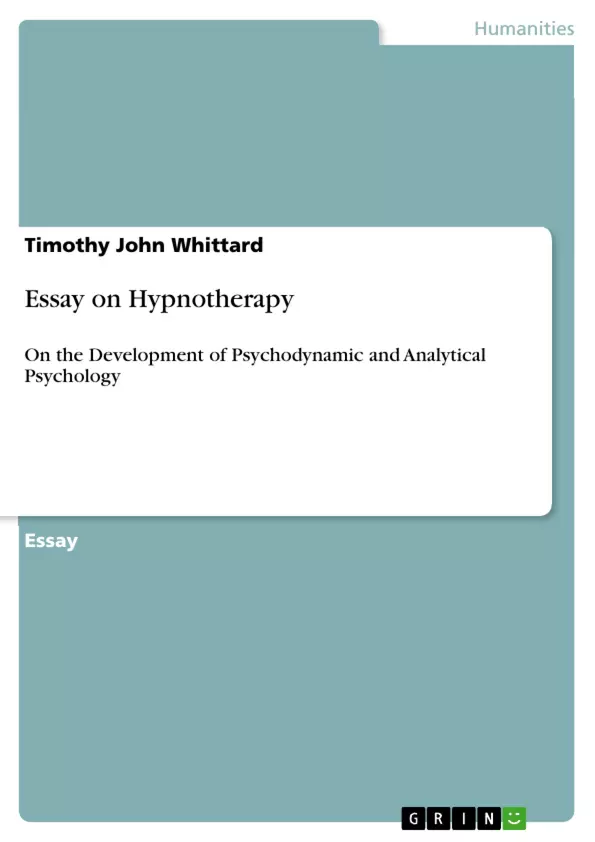This essay focuses on the development of psychodynamic and analytical psychology.
The following essay aims to discuss and explore six of the well-known individuals who have contributed heavily to the development of psychodynamic and analytical psychology, including their proposed theories and principles.
In addition to that, this essay aims to familiarise with the various considerations and factors relating to this subject and of learning more about the history and development these ground-breaking works.
Inhaltsverzeichnis (Table of Contents)
- Introduction
- Freud Psychoanalysis
- Jung Analytical Psychology
- Adler - Individual Psychology
- Perls - Gestalt Therapy
- Rogers Client-Centred Therapy
- Berne – Transactional Analysis
Zielsetzung und Themenschwerpunkte (Objectives and Key Themes)
This essay aims to discuss and explore six well-known figures who have made significant contributions to the development of psychodynamic and analytical psychology, encompassing their proposed theories, principles, and their impact on the practice of therapeutic hypnosis. The essay delves into the following key themes:
- The development of psychodynamic and analytical psychology
- The contributions of key figures in the field
- The impact of these theories on therapeutic practice
- The evolution of therapeutic approaches
- The differences and similarities between various theoretical perspectives
Zusammenfassung der Kapitel (Chapter Summaries)
- Introduction: This section introduces the essay's objective of exploring the contributions of six prominent individuals to psychodynamic and analytical psychology.
- Freud Psychoanalysis: This section explores Freud's theory of psychoanalysis, focusing on the unconscious mind and its influence on behavior. It highlights key concepts such as free association, defense mechanisms, and the stages of psychosexual development.
- Jung Analytical Psychology: This section examines Jung's analytical psychology, emphasizing his divergence from Freud's emphasis on sexuality. It highlights concepts such as individuation, the collective unconscious, and the stages of psychological development.
- Adler - Individual Psychology: This section delves into Adler's individual psychology, focusing on feelings of inferiority and their impact on behavior. It explores concepts such as the inferiority complex, the striving for superiority, and the role of social factors in personality development.
- Perls - Gestalt Therapy: This section investigates Perls' Gestalt therapy, emphasizing its departure from Freudian reductionism. It explores concepts such as the holistic view of the individual, the importance of the present moment, and the integration of thoughts, feelings, and actions.
- Rogers Client-Centred Therapy: This section examines Rogers' client-centered therapy, emphasizing the importance of empathy, unconditional positive regard, and the client's self-actualization. It explores concepts such as congruence, genuineness, and the therapeutic relationship.
- Berne – Transactional Analysis: This section delves into Berne's Transactional Analysis, focusing on the three ego states: Parent, Adult, and Child. It highlights the impact of early childhood experiences on personality development and the use of transactional analysis in various therapeutic approaches.
Schlüsselwörter (Keywords)
The key terms and concepts explored in this essay include psychodynamic psychology, analytical psychology, psychoanalysis, unconscious mind, free association, defense mechanisms, stages of psychosexual development, analytical psychology, individuation, collective unconscious, individual psychology, inferiority complex, striving for superiority, Gestalt therapy, holism, present moment, client-centered therapy, empathy, unconditional positive regard, self-actualization, transactional analysis, ego states, and therapeutic hypnosis.
Frequently Asked Questions
Which key figures in psychology are covered in this essay?
The essay discusses six prominent individuals: Sigmund Freud, Carl Jung, Alfred Adler, Fritz Perls, Carl Rogers, and Eric Berne.
What is the difference between Freud's and Jung's theories?
While Freud focused on the unconscious mind and psychosexual development, Jung's Analytical Psychology diverged by emphasizing individuation and the collective unconscious, moving away from Freud's heavy emphasis on sexuality.
What are the core principles of Carl Rogers' Client-Centred Therapy?
Rogers emphasized the importance of empathy, unconditional positive regard, and congruence (genuineness) within the therapeutic relationship to facilitate a client's self-actualization.
How does Gestalt Therapy by Fritz Perls differ from traditional psychoanalysis?
Gestalt Therapy moves away from Freudian reductionism, focusing instead on a holistic view of the individual, the importance of the present moment, and the integration of thoughts, feelings, and actions.
What are the three ego states in Eric Berne’s Transactional Analysis?
Berne identified three ego states: Parent, Adult, and Child, which are used to understand personality development and social interactions.
What is Alfred Adler’s contribution to individual psychology?
Adler focused on the "inferiority complex" and the "striving for superiority," highlighting how social factors and feelings of inferiority influence human behavior.
- Quote paper
- Timothy John Whittard (Author), 2018, Essay on Hypnotherapy, Munich, GRIN Verlag, https://www.grin.com/document/476688



